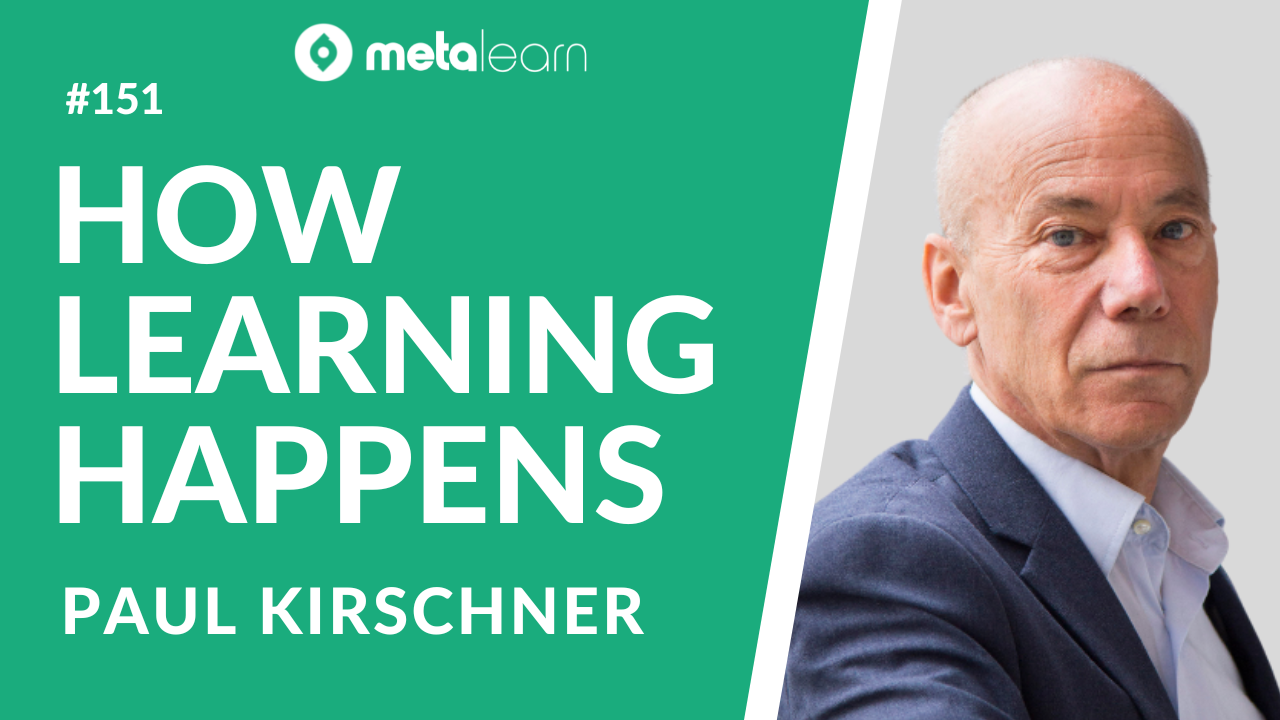ML151: Paul Kirschner on How Learning Happens, The Art & Science of Teaching and How Belief Impacts Performance
Learn about the leading educational researchers, why teaching is an art informed by a science and how our beliefs about our abilities impact our performance.

Paul Kirschner is a renowned educational psychologist and author. He is an Emeritus Professor of Educational Psychology at the Open University of the Netherlands Guest Professor at the Thomas More University of Applied Science in Mechelen, Belgium and owner of kirschner-ED.
His most recent book How Learning Happens, explores 28 key works on learning and teaching, chosen from the fields of educational psychology and cognitive psychology, and discusses what they mean in practice. He's also written books on Evidence Informed Learning Design and Urban Myths about Learning and Education.
In this episode we discuss:
- The educational researchers that have inspired Paul and laid the foundations for the field
- Why teaching is an art informed by a science, and how teachers should incorporate research on learning into their process
- The concept of self efficacy and how our beliefs about our abilities impact our performance
We also discuss when students should learn about how learning happens, the importance of teachers in goal setting and the debate on domain specific vs domain general skills.
Show Notes
- Introducing Paul Kirschner [00:37]
- Paul considers himself a quick learner. In fact, he was good in all disciplines; humanities, natural sciences, and social sciences. What was the catalyst that made Paul focus and dedicate his life to educational psychology? [05:44]
- Who are the people that influenced Paul’s educational research methods and understanding of the learning process? [06:53]
- How important is it that educators understand the learning processes of their students? How does this question the current training programs teachers currently have? [08:49]
- If the new methods of teaching and cognitive research are not being implemented through a systematic scale, what are the ways that teachers can apply updated educational methods to their classrooms? Paul explains the importance of knowing fundamental research. [12:36]
- How does behaviorism help in teaching and processing new information? [14:05]
- There are four things that dictate our belief in our own abilities according to Albert Bandura: performance accomplishment, vicarious learning, verbal encouragement, and emotional states. What does Paul have to say about these four things when tackling instructional materials? [15:50]
- How does being successful through proper and informative instructions shape the way we perceive ourselves? [16:45]
- As teachers, why is creating a proper and suited learning environment necessary for students to help understand themselves better and to instill a sense of accomplishment in them? How do we leverage the tools provided in ensuring that everyone learns? [18:31]
- Paul explains the role of a good teacher in achieving our individual goals and knowing how to get there. What are the three things that are needed to help students achieve mastery of their chosen field? [24:22]
- How early do we have to teach students to understand their respective learning processes? What are the benefits in using retrieval practice and spaced practice according to Paul? [29:48]
- Paul elaborates on the difference between domain-general skills and domain-general skills. How do these skills translate people’s creativity and their ability to solve a problem? [32:07]
- What makes a skill different from a trait? How do we distinguish between the two? [37:00]
- According to Paul, studying exceptional cases is not the best way to understand how normal cases work. Do these two types of cases make use of fundamental research as the basis to achieving mastery? [39:10]
- Closing statements [41:26]
Resources
Follow Paul online
- Paul's LinkedIn: paulkirschner
- Paul’s Twitter: @P_A_Kirschner
- Paul's research profile: Prof. dr. Paul Kirschner
- Paul's Google Scholar profile: Paul A. Kirschner
- Paul’s blogs: 3-Star Learning Experiences (English) & Paul's Random Thoughts / Gedachten (English/Dutch)

